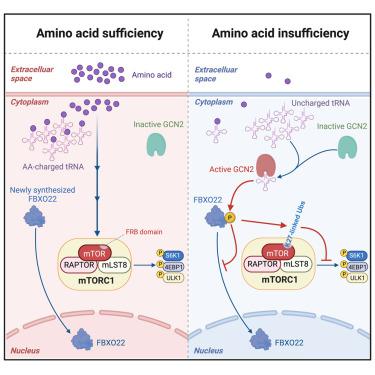Cell Metabolism ( IF 27.7 ) Pub Date : 2023-11-17 , DOI: 10.1016/j.cmet.2023.10.016
Meng-Kai Ge 1 , Cheng Zhang 2 , Na Zhang 3 , Ping He 2 , Hai-Yan Cai 4 , Song Li 5 , Shuai Wu 3 , Xi-Li Chu 3 , Yu-Xue Zhang 3 , Hong-Ming Ma 3 , Li Xia 3 , Shuo Yang 3 , Jian-Xiu Yu 3 , Shi-Ying Yao 6 , Xiao-Long Zhou 6 , Bing Su 5 , Guo-Qiang Chen 7 , Shao-Ming Shen 1

|
Mammalian target of rapamycin complex 1 (mTORC1) monitors cellular amino acid changes for function, but the molecular mediators of this process remain to be fully defined. Here, we report that depletion of cellular amino acids, either alone or in combination, leads to the ubiquitination of mTOR, which inhibits mTORC1 kinase activity by preventing substrate recruitment. Mechanistically, amino acid depletion causes accumulation of uncharged tRNAs, thereby stimulating GCN2 to phosphorylate FBXO22, which in turn accrues in the cytoplasm and ubiquitinates mTOR at Lys2066 in a K27-linked manner. Accordingly, mutation of mTOR Lys2066 abolished mTOR ubiquitination in response to amino acid depletion, rendering mTOR insensitive to amino acid starvation both in vitro and in vivo. Collectively, these data reveal a novel mechanism of amino acid sensing by mTORC1 via a previously unknown GCN2-FBXO22-mTOR pathway that is uniquely controlled by uncharged tRNAs.
中文翻译:

tRNA-GCN2-FBXO22轴介导的mTOR泛素化感知氨基酸不足
哺乳动物雷帕霉素靶点复合物 1 (mTORC1) 监测细胞氨基酸变化的功能,但该过程的分子介质仍有待完全确定。在此,我们报告细胞氨基酸的消耗,无论是单独还是组合,都会导致 mTOR 泛素化,从而通过阻止底物招募来抑制 mTORC1 激酶活性。从机制上讲,氨基酸消耗会导致不带电的 tRNA 积累,从而刺激 GCN2 磷酸化 FBXO22,FBXO22 反过来在细胞质中积累,并以 K27 连接的方式泛素化 mTOR Lys2066。因此,mTOR Lys2066 的突变消除了 mTOR 泛素化以应对氨基酸耗尽,从而使 mTOR在体外和体内对氨基酸饥饿不敏感。总的来说,这些数据揭示了 mTORC1 通过先前未知的 GCN2-FBXO22-mTOR 途径进行氨基酸传感的新机制,该途径由不带电荷的 tRNA 唯一控制。

































 京公网安备 11010802027423号
京公网安备 11010802027423号